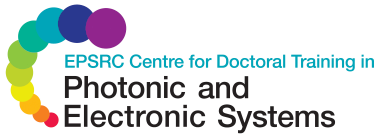Projects
Students undertake two mini-projects during their MRes year followed by a 3-year PhD research project.
IMAGE: Dr James Seddon, Photonics CDT graduate.
Overview
Students spend the first year of the programme undertaking a Masters of Research (MRes). This is an intensive course of taught modules and two mini-projects.
In their second year of the programme students begin a 3-year Postgraduate doctoral degree (PhD), supported by a supervisor and research group, working on a research project in the field of photonics.
We accept proposals for research projects from approved academic supervisors and industry partners throughout the year.
Read the guidelines for industry partners wishing to propose projects: Industry partner guidelines 2025.pdf
Current MRes mini-projects include:
- Artificial intelligence aided integrated photonics
- Eye-tracking system for enhanced holographic Augmented Reality (AR) displays
- Optical wireless data centre networks for Machine Learning
- Quantum secured network key management
- Near-Infrared optical wireless communication systems
- Developing Machine Learning methods with optical imaging to detect brain function patterns
- Optical modulation of liquid crystal in nanostructures
- Fibre-optic sensing and optical ultrasound imaging for healthcare applications
- Develop a system to enable super-resolution imaging of cell cultures in arctic conditions
- Nanowire photoconductive antenna arrays for terahertz spectroscopy
- Modelling SiPM detectors in LiFi Systems
- Understanding the optical response of memristor dynamics for neuromorphic computing
- Integrated photonics for automotive LIDAR
- Broadband metasurfaces
Current PhD research projects include:
- Advanced programmable photonic integrated circuits
- Large-area intelligent surfaces for Internet of Things (IoT)
- Artificial intelligence (AI) design aided photonic systems
- Efficient quantum key distribution (QKD)
- Hands-free gesture and vision control for remote operation of a drone using 3D computer-generated holography
- Terahertz imaging systems: beyond the diffraction limit
- High speed 3D super-resolution microscopy
- Wearable cardiac activity mapping systems
- Coherent devices for single photon quantum imaging (industry-based)
- Developing on-chip, DC powered THz sources for sensing and ultra-fast computing
- Benefits of deep reinforcement learning in optical networks
- Nanophotonics for efficient light absorption in fast detectors
- Optical metasurface integrated LCoS devices (Meta LCOS)
Project timelines
We accept project proposals throughout the year. Deadlines are outlined below.
| MRes mini-project 1 | ||
|---|---|---|
|
Submit proposal by: |
end of August |
|
|
Study mode: |
part-time |
|
|
Project start/end: |
November to May each year |
|
| MRes mini-project 2 | ||
|
Submit proposal by: |
late February |
|
|
Study mode: |
full-time |
|
|
Project start/end: |
June to August each year |
|
| PhD research projects | ||
|
Submit proposal by: |
early February |
|
|
Study mode: |
full-time, over 3 years |
|
|
Project start/end: |
October each year |
|
To submit a project proposal visit our Project Submission page.

